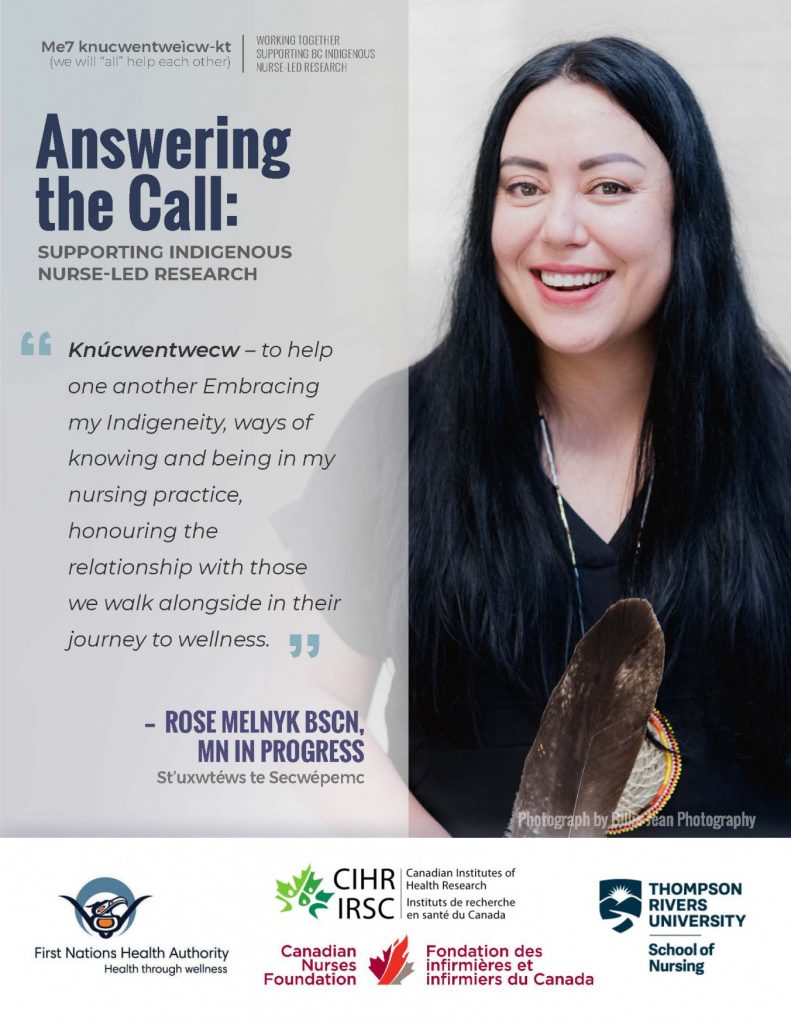A team of TRU grant holders are the proud recipients of the Michael Smith Foundation for Health Research Reach Award for their Participatory Indigenous Nursing Knowledge Translation project.
The award providees $15,000 for Associate Professor Lisa Bourque Bearskin and co-leaders Colleen Seymour, Judy Sturm, Rose Melnyk, and their team for their research project co-creating Indigenous wellness supports by and for Indigenous health-care professionals.
“The award helps our team to support the mobilizing of our original cluster research findings,” says Sturm, a former Indigenous mental wellness manager with Interior Health. “We will be hosting a forum, implementing the actual network, highlighting the need for more Indigenous support systems within Interior Health and sharing the research findings.”
Shared experience
Participants in the project include various health professionals who identify as First Nations and Métis people working within Interior Health, as well as researchers, sharing their experiences.
As an Indigenous health-care provider, Sturm is excited to be part of the project.
“I wanted to share what I have experienced and witnessed in my health-care profession as a nurse over 20 years and identifying as Indigenous,” says Sturm.
“Although I know I’m white-facing, I do have my First Nations status, and so sometimes you’re a bit more privileged with what you hear and see. And for me, growing up off reserve and really wanting more culturally relevant and applicable supports for myself in a health-care environment was important. Post-secondary institutes were leading as were other service industries around supports for Indigenous students and staff, but health was really far behind.”
Sturm says the 2020 In Plain Sight Report, which highlights Indigenous-specific racism and discrimination in BC health care, supports what Indigenous communities have known for some time.
“As much as people are doing a better job of trying not to be ignorant or racist, I think that report shows people that it’s still there,” says Sturm. “It also highlights that the Interior was the worst for some of these instances. From our perspective, as much as that report is more focused on the clients’ and families’ experiences, as a staff member, we’ve experienced these things, and I think that’s what our research will highlight.”
Translating research into practice
“As often stated, we want to position this work ‘For the Peoples,’” says Seymour, a Secwépemc teacher and knowledge keeper.
“This research also provided an Indigenous nursing leadership internship for graduate students to co-lead and inform the project right from the start with foundational values of the Secwépemc peoples, and by honouring the lived experience of Indigenous health-care providers working within the Interior Health region, as a distinction-based approach to transforming Indigenous health-care service delivery” explains Bourque Bearskin.

TRU graduate nursing student and Secwépemc scholar Rose Melnyk understands the importance of research and how it informs action.
“I saw there was an opportunity for research to influence the health-care system on the ground,” says Melnyk.
“For this project, we’re speaking specifically around knowledge translation, so it’s about translating research into practice. What we know is that knowledge translation hasn’t historically included Indigenous values or knowledge, so it’s not really the researchers who are the experts in this—it’s the people who are part of the research and the goal is in elevating their voices. Part of my role is to now bring back some of the research findings, which includes a call for change that’s inherently tied to action, and to further define how this information is then translated into practice and brought back to partners like Interior Health and others.”
Next steps
Looking ahead, the project working team—Tracy Mooney, Leslie Bryant, Melba D’Souza and Tina Lanceleve—remains optimistic and looks forward to creating meaningful changes for Indigenous health-care providers within Interior Health.
“Our hope is that because it’s feedback from Interior Health’s own staff, that it actually impacts them,” says Sturm.
“We’re really hopeful to start to integrate things that we have heard staff say that’s wanted, and creating a support network, which will inform what other things are needed.
“For me, it takes it from the head knowing to the heart knowing, to stimulate some action. The expectation from those who met with us and provided their stories was to make those changes and to make things better for them and for those health-care providers coming. Our perspective is trying to do your part in your lifetime to make it better for the next generation.”
Seymour adds: “Wel Me7 Yews, Wel Me7 Yews, Wel Me7 Yews…forever, forever, forever.”

